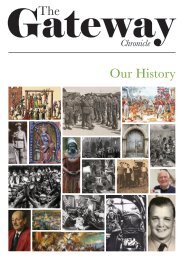Create successful ePaper yourself
Turn your PDF publications into a flip-book with our unique Google optimized e-Paper software.
42<br />
This brings us to the 6 th of January 878<br />
when Alfred was forcibly removed from<br />
power by a surprise invasion at Chippenham<br />
and went into hiding in the Somerset<br />
marshes. During this time, Alfred called<br />
upon his lords to raise their armies and to<br />
fight with him under the Christian banner<br />
of Wessex at what became the infamous<br />
Battle of Edington. Here Alfred won such<br />
a victory that the Danish armies agreed to<br />
split Mercia in two and have a north easterly<br />
Danish country called “Danelaw” and<br />
have a strong Wessex in the south west.<br />
Most notably though, the terms of this<br />
agreement signed at Wedmore/Chippenham<br />
included Guthrum (at this time believed<br />
to be the most powerful of his<br />
brothers) being baptised and having Alfred<br />
accept him as his adoptive son. It was<br />
this conversion of Guthrum (who then became<br />
Christian king AEthelstan by name)<br />
to Christianity that would reinvigorate the<br />
processes kicked into motion by Augustine<br />
300 years prior. This treaty ensured<br />
that across the area that would become<br />
England, Christians were both free to<br />
travel and preach in an environment<br />
where they were not persecuted by anyone.<br />
Furthermore, the way that Alfred dealt<br />
with the aftermath of the crisis, and the<br />
destruction of monasteries and churches<br />
across the country was incredibly important<br />
in preserving England as a Christian<br />
country. Within his own territories<br />
Alfred created a system of Buhrs or fortifications<br />
around settlements that would<br />
prevent from future Viking raids and lootings.<br />
As mentioned earlier in the article,<br />
towns and cities were where Christianity<br />
had taken hold and thus the word pagan<br />
developed for rural peoples who were<br />
polytheistic. Thus, the creation of fortified<br />
Burhs around major towns and cities ensured<br />
the survival of Christianity in Anglo-Saxony.<br />
Alfred ensured in his treaty<br />
that his missionaries could be sent to Minsters<br />
across Danelaw, and where they had<br />
been destroyed, he rebuilt them with the<br />
help of his newly baptised counterpart<br />
AEthelstan. This was important in ensuring<br />
the survival of a Christian Kingdom,<br />
which under Alfred’s son, Edward the Elder,<br />
and his grandson, also named AEthelstan,<br />
would be unified and become England.<br />
Adulthood?<br />
Since then, a lot has changed within the<br />
internal structures of the Church. Events<br />
set in motion by the invasion of William<br />
the Conqueror in 1066 would eventually<br />
lead to a disconnection from the Church<br />
felt by the average man or woman. This<br />
religious extravagance would then become<br />
the justification of a tyrannous Monarch<br />
450 years later for transitioning the<br />
Church into a new Protestant Church.<br />
However, since those Christian mourners<br />
wept on the roads of Winchester, they,<br />
and their descendants, have remained<br />
part of a Christian nation.<br />
Firstly, the Roman empire laid the foundation<br />
of Christian ideals such as monotheism<br />
and a degree of tolerance that were<br />
important in sowing the seeds of Christianity<br />
amongst the Anglo-Saxon masses, as<br />
well as providing the political context<br />
through which to normalise it elsewhere<br />
and provide footings that would last long<br />
into the future. Secondly, the arrival of<br />
Augustine at the end of the 6 th century<br />
was incredibly important in developing<br />
the first system of worship on our Island.<br />
Augustine’s systems incredible success is,<br />
in my mind at the very least, creditable<br />
with ensuring that Christianity could recapture<br />
the hearts and minds of the Anglo-Saxons<br />
and the Britons. Finally, Alfred<br />
provided a strong Christian leader that<br />
was crucial in preserving the influence of<br />
the church on our island. Thus, the Christian<br />
vagabond found a home within England<br />
as the result of an empire, a small<br />
group of monks and a single Christian<br />
king.<br />
Sam, L6JPD


















